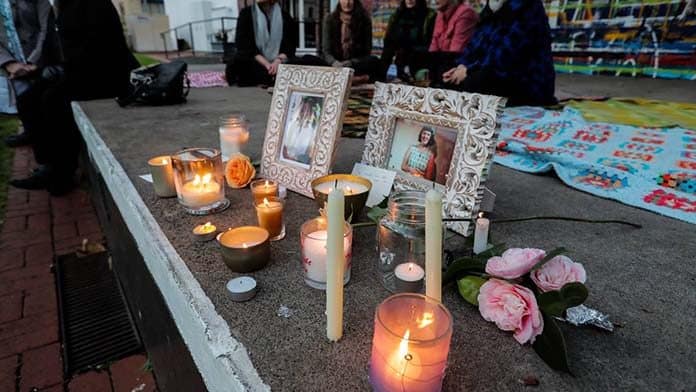Blaming men for sexism and rape obscures the way women’s subordination is structured into capitalism, writes Lucy Honan, and our common interest in fighting it
In the weeks since Jaymes Todd allegedly raped and killed Eurydice Dixon, the liberal theory that the attitudes of men at large cause violence against women has thickened into an unquestioned mainstream common sense.
The police and those who defaced her memorial poured blame and hatred on Eurydice herself.
But almost every other commentator, including Turnbull, Shorten, Adam Bandt and Clementine Ford has earnestly pointed to men—even the “littlest boys” as Turnbull put it—as those responsible for a culture of hatred and violence against women.
The hypocrisy from Turnbull should have incited outrage. How convenient that those little boys and the people who raise them have to take the blame, while Turnbull’s lesson in misogyny of unaffordable childcare costs and a widening gender pay gap is meant to go unnoticed. When Turnbull says “all men” must learn to respect women, he is shifting the blame to cover up for the sexism of the system.
But from people like Adam Bandt, and other more genuine anti-sexist commentators, the call for men to take responsibility and change the culture only allows Turnbull and those who really are responsible for sexism to bury the real, systemic issues under self-flagellation or demands for interpersonal call-outs.
What could stop rape?
Despite the prevailing common sense, sexism cannot be educated away. Perpetrators of violence against women are likely to hold “traditional and hierarchical” attitudes about women, so it seems to follow that changing their attitudes is the key.
Organisations like the feminist campaign Our Watch promote programs for schools and parents that aim to counter violence by teaching gender equality to children, while universities are promoting consent modules to educate undergraduates.
But Our Watch’s own review of research into gendered violence prevention education reports that programs that fail to “address gendered structures, norms and practices in that setting” don’t work well, and can actually be counter-productive.
Trying to teach students to abandon sexist attitudes in their relationships while leaving unchallenged things like sexist school uniforms, sexist course selection processes, and the systemic undervaluing of teaching as “women’s work” just doesn’t cut through, or worse, provokes a backlash against what is easily seen as moralising hypocrisy.
The same is true in the world outside of educational institutions. The effort to shift attitudes by focusing on calling out men, instead of organising to challenge the ruling elites and the system’s enforcement of family and gender roles, will not work.
The “all men are responsible” approach labels men as potential perpetrators rather than potential allies in a common struggle against a rotten system.
Sexism is structured into our entire society. Calling out men’s behaviour on social media, strategising about ways to confront “casual sexism” in public spaces, or for men to be thinking about how to tactfully show that they really are a good ally of women without appearing to be a poser are stressful, time consuming and a misuse of energy and momentum that should be spent fighting the causes of oppression together.
The causes of sexual violence are deeper than the behaviour that interpersonal politics hopes to correct.
Women are crushed under the burdens of un-paid childcare, underpaid work, and socialised by media stereotypes and objectified sexualities by the same class which exploits and dehumanises men.
Women’s oppression comes from the systematic discrimination against women within capitalism, in particular the role of the nuclear family in the system.
The family plays a crucial social role reproducing and raising the next generation of workers. But the family is fundamentally a service to capitalism not to men.
Men do not have an objective interest in maintaining women’s oppression; male workers do not gain from women’s lower wages or the lack of access to child care or abortion.
Capitalism creates conditions for rape
The way that Eurydice Dixon was raped and murdered was shocking. But most violence against women is inflicted in their home, by a person they know.
Current or previous partners pose the greatest risk of violence for physical, sexual or emotional abuse. On average, a woman is murdered by a current, or former, partner once a week in Australia.
These facts tell us there is clearly something dangerous about the way our most intimate relationships are structured.
Gender roles in the family are still profoundly unequal. The latest Household Income and Labour Dynamics in Australia (HILDA) survey shows that heterosexual couples will share the total amount of time spent in paid and unpaid work almost exactly equally.
But because men spend more time in paid employment, and women are usually paid less, and spend a larger proportion of their time doing unpaid housework and childcare, men have more economic power than women do in relationships. This is especially true of couples with children.
Couples are not structuring their relationships like this because they have backward ideas.
The HILDA survey also showed that agreement with traditional attitudes towards parenting and paid work is relatively low. But women are still paid less than men, so it often makes economic sense for couples that men take on more paid work compared to women. And housework and childcare is a totally private, not public responsibility, so the traditional family roles become impossible to escape.
Relationships sometimes break violently along this faultline of inequality, especially when they come under stress.
The specific circumstances of Eurydice Dixon’s rape and murder also point to the need to look beyond the superficial analysis of male violence. Jaymes Todd grew up in Broadmeadows, one of Victoria’s youth unemployment “hot-spots”.
He has autism, a disability for which no one in Australia receives adequate support. He went to an under-funded school where disadvantage is concentrated.
This context of class oppression is not incidental to his acts of violence. As with other examples of gendered violence, stranger rape is much more likely to occur in a context of social and economic inequality. Poverty degrades and alienates all of us, and leaves people feeling inadequate, and angry.
It also compounds women’s oppression. The nuclear family channels the blame for capitalism’s social problems onto women.
Our society treats the consequences of poverty like poor nutrition, social isolation and housing instability as a mother’s failure, not the system’s failure.
Turnbull has just cut childcare subsidies for women who are under-employed or out of education—a punishment for the women and children who most need social support.
Alongside the blame that is heaped on women by structures of poverty and the nuclear family, there are oceans of advertising and media creating stereotypes and objectifying women’s bodies.
Billions of dollars are spent by ruling class figures (like Rupert Murdoch and Harvey Weinstein) depicting women in humiliatingly dependent situations, as air-brushed, empty-headed, powerless props, a commodity to be bought and controlled by successful men.
It is little wonder in such a society that some men frustrated by social and economic exclusion resort to stealing sex, through rape.
The system is the problem, not men
We can’t afford to confuse the inter-personal expressions of sexism for the fundamental social causes, or to regard all men as enemies of women.
Despite the fact that our society is organised in a way to guarantee sexist violence, and divide women and men, working class women and men have a common interest in fighting sexism and class oppression.
The struggle for well-funded, fully public services, like childcare, schools, hospitals, disability support, transport and housing are important for all workers. They are important for fighting back against the subordination of women.
All working class children and adults benefit when caring is a recognised, valued responsibility for our whole society, not the invisible slave labour of women.
Every fight against privatisation, or for public funding, or equal wages needs be explicitly understood as an integral part of the fight for women’s rights.
People’s attitudes are changed in struggles that challenge the fundamental structures of inequality and oppression.
The fight against governments, church leaderships, principals, media and advertising barons and employers is by definition more threatening to the ruling class than the current ineffective approach of asking women and men to reflect on their own internal biases.
The system turns all working people, but women in particular, into objects for the rich to use and discard. To stop rape we need to fight the system that is inherently violent, that subordinates women and creates the conditions for rape.






